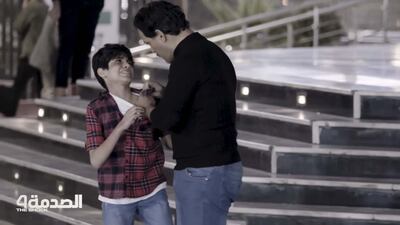A provocative hidden camera TV show broadcast across the Middle East has sparked debate over whether parents should smack their children.
The MBC series Al Sadma — Arabic for “the shock” — shown during Ramadan, captured public reactions to shocking staged incidents in an attempt open up dialogue on a range of topics.
In one recent staged scene, a father is seen dragging his child, aged about 8, down the street while hitting him and shouting at him.
Many members of the public reacted with outrage, with the film crew having to intervene to prevent one man from attacking the actor playing the father.

The series has raised questions over whether hitting a child can ever be acceptable.
The National spoke to parents to gauge their views.
Keep lines of communication open
“Hitting has never been an effective method of disciplining a child,” said Younis Ibraheem, 49.
The father of three children, aged 20, 14, and three, believes the approach only creates a hostile atmosphere for children.
“Children would probably think their parents are just waiting for them to make a mistake so they can hit them,” he said.
“If parents provide a loving environment where healthy communication allows children to freely say and discuss what's on their mind, they will better learn.”
Not a traumatic experience
One of 14 siblings, Palestinian Khadeejeh Jebril was often spanked as a punishment when she was a child, but does not believe it was a traumatic experience.
“We all were, but I don’t recall why. I mean the things we used to do were not serious, like messing up the house or fighting with one another,” she said.
“It's not like my mom was a bad mother ― not at all ― but I assume because we were too many she didn’t think of any other way.”
Ms Jebril said she and her siblings had not been negatively affected by this aspect of their upbringing.
But as a mother herself, she never lays a hand on her children to correct bad behaviour, and instead she talks to them.
“Even when I am super-angry, I can't hit them,” she said.
Disciplining children can be effective
For Jordanian mother-of-five Maha Jamal, 40, a light smack is effective when it comes to correcting her children’s behaviour.
“When I say I hit my kids to punish them, it's not what one might think, it's a slight spank on the back or bottom,” she said.
Striking children shows loss of control

Hiyam Abo Mashaal, a psychologist and family therapist, said parents should not hit children, especially younger ones.
“The aim of disciplining is to teach children manners and self-control,” said Ms Abo Mashaal, from the Hamsa Centre for Social, Psychological and Family Consultancy in Dubai.
“Hitting doesn’t serve that purpose. On the contrary, it subjects the child to humiliation, among many other effects.”
She said children learn by observing adults — particularly their parents — and hitting children teaches them how parents are unable to show restraint.
It makes them fearful of their parents, teaches them to avoid getting caught and that it is acceptable to hit others when they are angry, she said.
The therapist said recognising good behaviour is part of discipline and urged parents to not underestimate the positive effect their praise can have on their children.
“I have dealt with several cases where children aged between 7 and 11 have been hit by their parents because they didn’t listen, ignored their homework or are stubborn,” said Ms Hiyam.
“The behaviour was not corrected and instead, those children grew up to be aggressive, withdrawn, or lacking self-esteem.”
Child protection laws in place
The UAE approved robust child protection legislation, known as Wadeema's Law, in 2016.
It lays out the legal rights of minors in the country and protects children, defined as anyone aged under 18, from all types of abuse, be it physical, verbal or psychological.
It does not specifically cover the issue of corporal punishment, but a legal expert said any act of discipline which leads to “physical harm” is punishable under law.
“Being part of raising children, disciplining them is a long process and it should not include any act that may cause humiliation, emotional or physical harm in order to ensure these consequences do not lead to criminal charges as per the country’s law,” said Nida Al Masri, a legal consultant with Justitia Advocates and Legal Consultants.
“We don’t see many child abuse cases in the country and the few that would make headlines could be prevented if parents were aware of how abuse is different from disciplining.”


